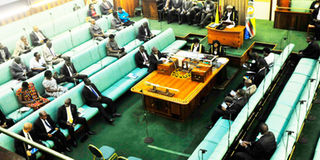Court halts Parliament move on scribes without degrees

The High Court has put on hold Parliament’s plan to bar reporters without degrees from covering proceedings of the legislature and its committees
Kampala. The High Court has put on hold Parliament’s plan to bar reporters without degrees from covering proceedings of the legislature and its committees.
Ms Beatrice Stella Atingu, the assistant registrar of the Civil Division of the High Court, granted the temporary injunction last Friday to protect the constitutional rights of the journalists currently covering the House.
The Uganda Parliamentary Press Association (UPPA) secretary general, Mr Moses Kajangu, had on January 15 petitioned the court after Parliament communicated new requirements for journalists who will cover House business in the 10th Parliament, starting in May.
“The balance of convenience is in favour of temporarily halting the implementation of the impugned accreditation criteria,” Ms Atingu directed. She set January 28 for the hearing of the main application with the Attorney General and Parliament Commission as respondents.
The deputy Clerk to Parliament, Mr Okello Obabaru, had on January 11, written to news editors, asking them to nominate graduates, with three years’ experience, to cover parliamentary business. Mr Obabaru said the requirement was to ensure reporters accredited to cover the House would be “fair, accurate and balanced.” He gave the editors up to January 25 to have furnished the clerk’s office with reporters’ names and degree certificates.
On the basis of this directive, Mr Kajangu went to court, saying the directive infringes on the reporters’ rights.
In an opinion in this issue of the Daily Monitor, Parliament’s director, communication and public affairs Chris Obore says the claim that the new requirements would infringe on the journalists’ rights were false.
“It’s one thing to have a right but there are requirements that qualify you to exercise that right,” Mr Obore said.
THE BACKGROUND
According to the proposed requirements, accreditation to cover Parliament will have to be renewed annually, unlike the case today where the accreditation covers Parliament’s full five–year term.




